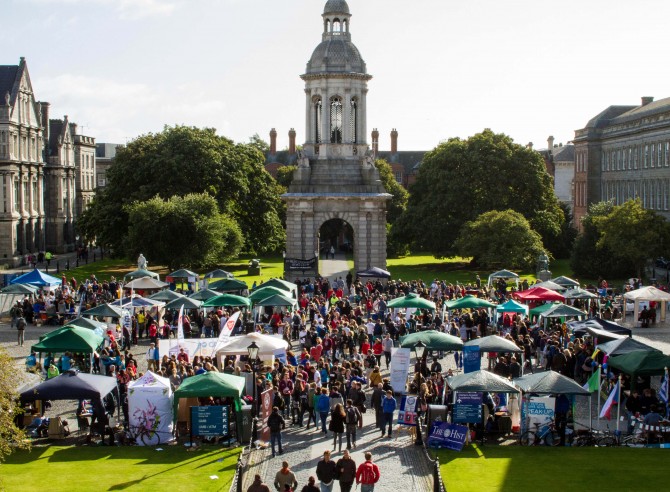
DUGES was last year cautioned by the Central Societies Committee (CSC) when the society Twitter account criticised Trinity College Dublin Students’ Union (TCDSU) presidential candidate, Brian Mallon, in relation to misogynistic comments he had posted online.
In response to the CSC’s warning, the former Chair of DUGES, Aine Palmer, stated: “At the time, trying to ask questions through the society social media platform seemed appropriate, as those who follow us expect content relating to gender equality issues on campus.” Palmer raised a valid point: why should student political involvement be limited to publications and TCDSU? As the beating heart of the College community, often representing specific interests, shouldn’t societies be granted a seat at the table of student activism?
The CSC’s resistance to the politicisation of societies is twofold: that the “primary object” of a society should not overlap with that of any other College grouping, as outlined in the Committee’s constitution; and that TCDSU, as the “only representative body for all students in Trinity College”, should be responsible for any and all political advocacy.
While TCDSU is the only group which can claim to speak on behalf of the student population as a whole, this is also the union’s main failing. The hegemonic, one-size-fits-all approach of student unions across the country is at odds with the diverse communities they seek to represent. The multitude of SU mandates, for example, are unlikely to be valued equally by the average student, with some issues receiving more investment from the student body than others.
While the SU ought to take a stand on social issues, resources are limited. The organisation has, in the past, been criticized for failing to deal with day-to-day, “on the ground” student concerns, such as library sockets, water fountains, off-campus engagement, and dedicated student spaces. Many students feel that the campaigns on which the SU are most effective are those of least importance to the average student; a view which was clearly expressed in a survey taken as part of the Union’s Strategic Plan.
Further problems arise once the SU has been mandated to act on an issue. A committee is hastily formed, and often comprises of Class Reps who know little, or nothing, about the cause at hand. This process is both alienating and ineffective. Regular union members who may wish to become involved with the initiative itself, but not with student politics in general, are isolated, and the wealth of energy and resources possessed by societies remains untapped.
There is no reason why certain tasks and elements of campaigns could not be delegated to societies who wish to be “politically” active, with TCDSU acting as a facilitative, consultative body. Societies would, in their diversity, create a more informed, nuanced patchwork of student representation to replace oversimplified, blanket SU mandates.
While the SU is a necessary fixture in student life, it cannot be held to account by its members in the same way as societies. While all students automatically become members of the union, with a compulsory contribution fee and a complex (or possibly non-existent) opt-out policy, the existence of a society is dependent on a minimum membership of 200 College members, and subject to regular review. A society therefore must act in the best interests of its members in order to secure future sign-ups.
Moreover, unlike politicised bodies, societies are not tied to mandates made by those who have graduated or are no longer affiliated with the group. As a result, societies would be more likely to campaign on issues affecting its current members. A more individualised approach to activism would facilitate grassroots movements, developing organically among like-minded groups of students without the hierarchy and endless red tape of the SU.
Some might argue that political, grassroots lobby groups, such as Fossil Free TCD, Students Against Fees, and Students for Justice in Palestine have been hugely successful, attracting the attention of the greater student body and, in some cases, garnering widespread support. However, becoming involved in such lobbying is likely daunting to shy or withdrawn students, not to mention those from systematically underrepresented groups or communities.
Allowing societies to work alongside or independently of lobby groups would facilitate an intersectional approach to social and political activism, bringing diversity of thought and opinion to the fore, and ultimately building a groundswell of wide-ranging support that is currently quelled by CSC regulations.
Although there are obvious benefits to allowing capitated bodies to become politically active – funding for events and advertising, coveted office and storage space, etc. – it is the cultural and human capital of societies that are of greatest value to student activism. From coffee mornings to structured debates, societies provide a range of spaces in which topics can be discussed on a spectrum of formality, making them more accessible than traditional political organisations.
By enabling societies to engage with political activity, there is scope for greater diversity of political voices, as well as improved structural and interpersonal support for those involved in campaigns. Starving lobby groups of such support, and wider resources, inflicts additional, unnecessary strain on those who have already gone the extra mile for the benefit of the wider College community.
The assumption that students can simply “switch off” and become apolitical in their free time is naive and misguided. The campus is where we discuss and test the theories we learn in classes, to learn about ourselves and the world around us.
To prevent us from acting on our political convictions through societies is infantilising in the extreme, and disempowers the student voice. It ignores the fact that the political convictions of students are not shaped independently of our identity, interests, and cultural practices. Rather, their formation is a process of interaction, and blurs the very lines between the personal and the political which the CSC’s constitution attempts to delineate. A college which truly appreciates diversity of leadership is one that not only allows but encourages a multifaceted approach to political action.






